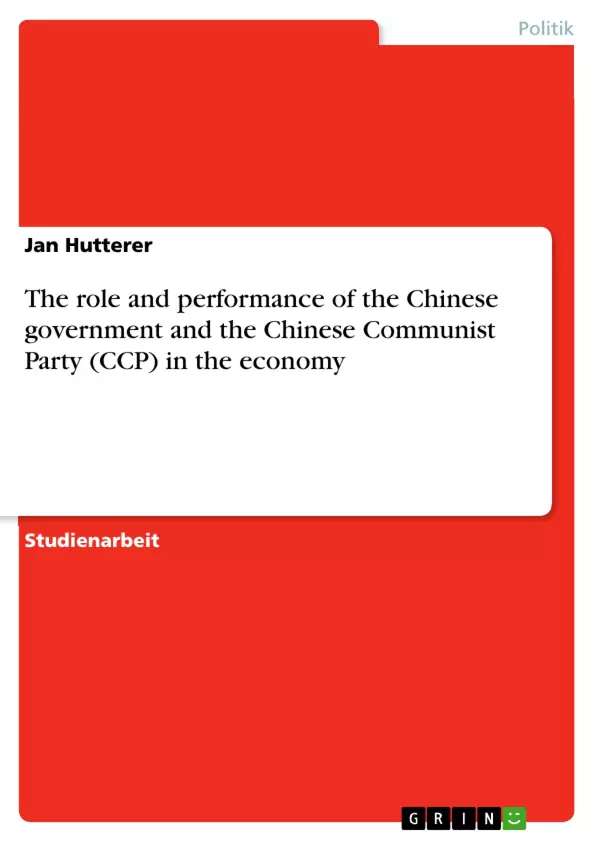The study analyses the political power of the CCP and the central government and tries to draw a realistic picture of their chances to shape Chinas development process. Here within, the study pays special attention to the role of the State-owned Assets Supervision and Administration Commission of the State Council (SASAC). Based on this analysis the study analysis means to measure the success of the political reforms by using economical, social variables and political benchmarks.
Inhaltsverzeichnis
- 1. Introduction
- 2. The Role of the Government and the CCP in the Economy
- 2.1. Practical Operation of the Political System
- 2.2. Role of the SASAC
- 2.3. Appointment of Listed Companies
- 2.4. Key Policy Making Process
- 3. The Performance of the Government and the CCP in the Economy
- 3.1. Economical Factors
- 3.2. Social Factors
- 3.3. Specific Targets
- 4. Conclusion
Zielsetzung und Themenschwerpunkte
Diese Studie untersucht die Rolle der chinesischen Regierung und der Kommunistischen Partei Chinas (KPCh) in der chinesischen Wirtschaftsentwicklung seit der Einführung der „Reform und Öffnungspolitik“ 1978. Sie analysiert den Einfluss der KPCh auf politische und wirtschaftliche Entscheidungsprozesse und bewertet den Erfolg der Regierungspolitik anhand verschiedener ökonomischer und sozialer Indikatoren. Die Studie vermeidet abschließende Wertungen und konzentriert sich auf die Darstellung der komplexen Zusammenhänge.
- Die praktische Funktionsweise des chinesischen politischen Systems und die Beziehung zwischen KPCh und Regierungsorganen.
- Der Einfluss der KPCh auf die Wirtschaftspolitik und die Entscheidungsfindung.
- Die Bewertung der wirtschaftlichen Leistung der Regierung und der KPCh anhand verschiedener Indikatoren.
- Die Berücksichtigung sozialer Faktoren im Kontext der wirtschaftlichen Entwicklung.
- Die Analyse spezifischer politischer Ziele und ihrer Umsetzung.
Zusammenfassung der Kapitel
1. Introduction: Die Einleitung beschreibt den beeindruckenden wirtschaftlichen Aufstieg Chinas seit der Öffnungspolitik von 1978 und stellt die zentrale Forschungsfrage nach der Rolle der chinesischen Regierung und der KPCh in diesem Prozess. Sie hebt die Notwendigkeit hervor, die praktischen Auswirkungen des politischen Systems zu verstehen, um die Leistung der Regierung adäquat zu beurteilen. Die Einleitung betont die weitreichenden globalen Auswirkungen der chinesischen Entwicklung.
2. The Role of the Government and the CCP in the Economy: Dieses Kapitel befasst sich mit der komplexen Beziehung zwischen der KPCh und den staatlichen Institutionen. Es wird deutlich gemacht, dass die theoretische Struktur des politischen Systems stark von der Praxis abweicht. Der Fokus liegt auf der praktischen Durchsetzung der KPCh-Führung in den Regierungsorganen, trotz der formalen Machtbefugnisse des Nationalen Volkskongresses (NVK). Die Untersuchung der praktischen Beziehungen zwischen der KPCh und der Regierung ist entscheidend, um die politischen, wirtschaftlichen und kulturellen Veränderungen in China zu verstehen.
Schlüsselwörter
Chinesische Regierung, Kommunistische Partei Chinas (KPCh), Wirtschaftsentwicklung, Politisches System, Reform und Öffnungspolitik, Wirtschaftsleistung, Soziale Faktoren, Entscheidungsfindung, Nationaler Volkskongress (NVK).
Häufig gestellte Fragen (FAQ) zur Studie: Die Rolle der chinesischen Regierung und der KPCh in der Wirtschaftsentwicklung
Was ist der Gegenstand dieser Studie?
Diese Studie untersucht die Rolle der chinesischen Regierung und der Kommunistischen Partei Chinas (KPCh) in der chinesischen Wirtschaftsentwicklung seit 1978, dem Beginn der „Reform und Öffnungspolitik“. Sie analysiert den Einfluss der KPCh auf politische und wirtschaftliche Entscheidungen und bewertet den Erfolg der Regierungspolitik anhand ökonomischer und sozialer Indikatoren.
Welche Aspekte des chinesischen politischen Systems werden behandelt?
Die Studie beleuchtet die praktische Funktionsweise des chinesischen politischen Systems und die Beziehung zwischen der KPCh und Regierungsorganen. Sie untersucht die Durchsetzung der KPCh-Führung in der Regierung und den Unterschied zwischen der theoretischen Struktur und der Praxis. Ein besonderer Fokus liegt auf der Rolle der Staatsaufsichts- und Verwaltungs-Kommission der Staatsrats (SASAC) und dem Prozess der Ernennung in börsennotierten Unternehmen.
Wie wird die Leistung der Regierung und der KPCh bewertet?
Die Bewertung der wirtschaftlichen Leistung erfolgt anhand verschiedener ökonomischer und sozialer Indikatoren. Die Studie berücksichtigt sowohl wirtschaftliche als auch soziale Faktoren und analysiert spezifische politische Ziele und deren Umsetzung. Es werden keine abschließenden Wertungen vorgenommen, sondern die komplexen Zusammenhänge dargestellt.
Welche Kapitel umfasst die Studie?
Die Studie beinhaltet eine Einleitung, ein Kapitel über die Rolle der Regierung und der KPCh in der Wirtschaft (inkl. Unterkapitel zur praktischen Funktionsweise des politischen Systems, der Rolle der SASAC, der Ernennung von Führungskräften in börsennotierten Unternehmen und dem politischen Entscheidungsprozess), ein Kapitel zur Leistungsbewertung der Regierung und der KPCh (inkl. Unterkapitel zu wirtschaftlichen und sozialen Faktoren sowie spezifischen Zielen) und abschließend ein Fazit.
Welche Schlüsselwörter beschreiben die Studie?
Schlüsselwörter sind: Chinesische Regierung, Kommunistische Partei Chinas (KPCh), Wirtschaftsentwicklung, Politisches System, Reform und Öffnungspolitik, Wirtschaftsleistung, Soziale Faktoren, Entscheidungsfindung, Nationaler Volkskongress (NVK).
Was ist das Ziel der Studie?
Die Studie zielt darauf ab, die Rolle der KPCh und der chinesischen Regierung in der Wirtschaftsentwicklung Chinas zu verstehen und zu analysieren. Sie möchte den Einfluss der KPCh auf politische und wirtschaftliche Entscheidungen aufzeigen und die Effektivität der Regierungspolitik bewerten, ohne dabei wertende Schlussfolgerungen zu ziehen.
Welche globalen Auswirkungen werden betrachtet?
Die Studie betont die weitreichenden globalen Auswirkungen der chinesischen Wirtschaftsentwicklung.
- Quote paper
- Jan Hutterer (Author), 2007, The role and performance of the Chinese government and the Chinese Communist Party (CCP) in the economy, Munich, GRIN Verlag, https://www.grin.com/document/71716



